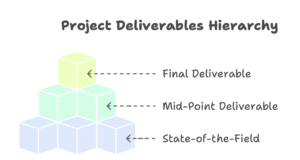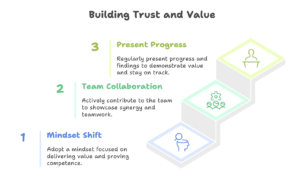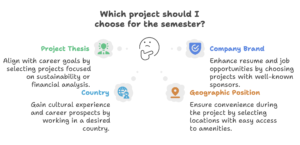Overview of Thunderbird GCL
I know many of you are excited about GCL—staying in a new city for three weeks and working with a diverse team in a completely different environment. There are a few things I believe will help you manage your expectations and ultimately have a better experience and create lasting memories.
The program follows a discovery-analysis-recommendation approach. You’ll have three major assignments or presentations: the State-of-the-Field, Mid-Point Deliverables, and Final Deliverables. It’s easy to follow the timeline designed by your professor. In other words, it can feel like just three school projects you need to complete in six weeks. However, your level of effort and how you communicate with your project sponsor will shape your learning and your overall experience.
Communication with your project sponsor begins before the official kickoff of the GCL project. You’ll introduce your team and start receiving some initial information by email. This is when you can begin to observe and understand the company’s culture and organizational structure. Specifically:
• Who is the main point of contact?
• Who are the potential stakeholders?
• How long do they usually take to respond?
At the same time, I encourage you to get a sense of your teammates’ working styles and start building rapport within the team.
Let’s talk about the deliverables
State-of-the-Field Due at the end of the first week. You don’t need to present this to your professor or project sponsor. The purpose is to kick off the discovery phase, research the industry and the company, and build your own methodology and plan for the project.
Mid-Point Deliverable Due at the end of week four. You’ll present this to your project sponsor on-site. The goal is to showcase your research and analysis. This deliverable helps lay the foundation for your final recommendations and ensures you’re aligned with the sponsor’s expectations.
Final Deliverable Due at the end of the last week. You’ll present this to both your professor and project sponsor in a virtual meeting. The final presentation should cover everything the sponsor requested, along with your recommendations for their plans.

Meeting with Your Professor
- They’ll be interested in understanding your process and how you’re interacting with your sponsor. For example:• How did you present your ideas?
• What feedback did you receive?
• What’s your plan for the upcoming week?
• How will you meet the sponsor’s expectations? - Take advantage of these meetings to ask questions or resolve internal disagreements. In my experience, faculty meetings are helpful to clear up any confusion. I recommend providing enough detail to help your professor understand the context, but not so much that they get lost in it.
Meeting with Your Project Sponsor
- Adopt a mindset that you’re there to bring value and prove yourself first. It’s normal for them to see you as a student rather than a consultant. To build trust, deliver valuable research and data points early on.
- Focus on working as a team. It’s natural to want to stand out in front of the sponsor. After all, we’re here to find a job after graduation. But actively contributing as part of a team and demonstrating how your different skills complement each other is a great way to show that you’re both a strong team player and an independent contributor, which are qualities every company values.
- Try to share your progress and findings in every weekly meeting. You can show them with your presentation, or having an interview with them to ask clarification questions. While this isn’t strictly required, it helps ensure you’re moving in the right direction and reinforces the value you bring as someone new to the industry.

Selecting a Project
You’ll receive an Excel sheet listing all the available projects for your semester. Everyone will have different priorities, but here are a few factors I recommend considering:
- Project Topic: Most projects focus on market expansion or operational improvement, but some are about sustainability, financial analysis, or compliance. Try to choose a project that aligns with your career goals.
- Company Brand: Working with a well-known sponsor can be a nice boost for your resume and may open up networking opportunities. If it’s a large organization, you’ll also have access to more stakeholders to interview, which can help both your project and your career exploration.
- Country: Spending three weeks working in a particular country gives you a valuable window into its working culture. If you’re thinking about pursuing a career there, I say go for it.
- Location: Project sponsors usually recommend hotels close to their offices. The convenience of your stay will largely depend on where the firm is located. I strongly encourage you to look up the office on Google Maps before you submit your preferences. Check for transportation options, nearby restaurants, and grocery stores.

Finally, the balance of work and tourism.
Balancing Work and Travel
Like many of you, I was excited to explore the city and planned weekend trips to other places.
Here are two pieces of advice:
- Clarify Expectations: Don’t hesitate to ask about their expectations for your schedule. Do they expect you to work remotely on certain days, like Fridays? Should you stay flexible and available during business hours?
- See Yourself as a Partner, Not an Employee: You’re there to collaborate and provide insights. You’re free to schedule meetings with other organizations if it helps you deliver a more complete report. You can also be creative with your solutions. And yes, if it helps your productivity, you can work from cafés.
Generally, you’ll have time to explore the city after work on weekdays and visit other cities on weekends. Again, look up the location before applying.
Here is a bonus for reading the whole document!
A Bonus Tip About Teamwork
Most T-birds are already used to team projects, with all their highs and lows. But GCL is different from any team project you’ve done before. Why? Because you’ll be spending almost 24 hours a day together for three weeks.
The relationships you build will be both professional and personal. You’ll likely feel more comfortable with some teammates in certain contexts. My advice is to separate those two spheres: stay professional during work, even if you’ve become good friends. And don’t judge someone’s personality solely based on their work style.
It is fine if you don’t get along well with your teammates outside of work. It is not a project meant to find BFF, but to build your professionalism.
Good luck!!